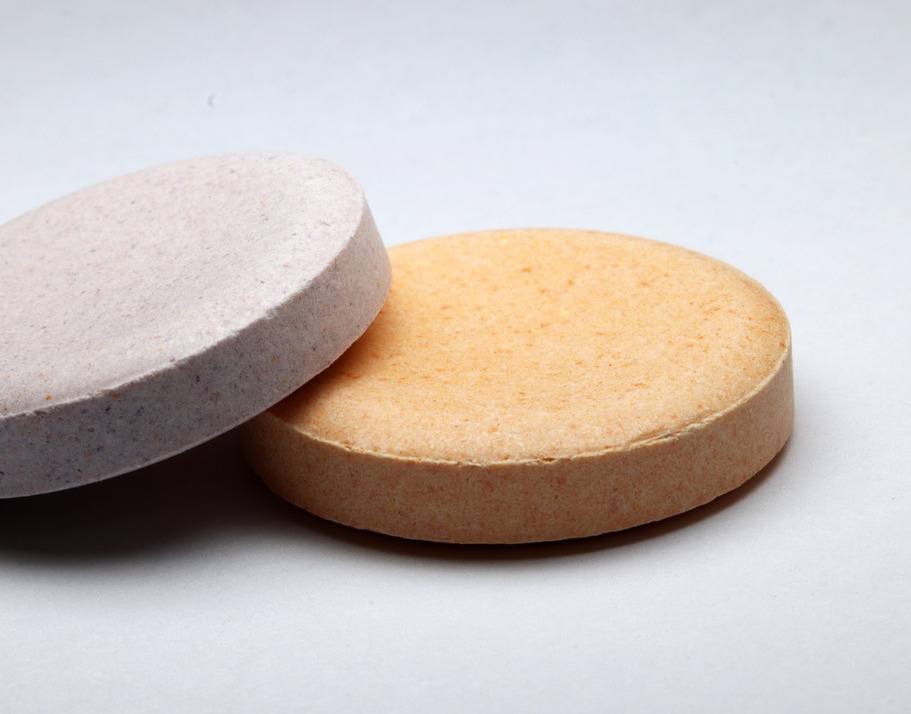

Is a glass of OJ or vitamin C tablets your go-to when the sniffles come? Loading up on this vitamin was a practice spurred by Linus Pauling in the 1970s, a double Nobel laureate and self-proclaimed champion of vitamin C who promoted daily megadoses (the amount in 12 to 24 oranges) as a way to prevent colds and some chronic diseases.
Vitamin C, or ascorbic acid, is a water-soluble vitamin. This means that it dissolves in water and is delivered to the body’s tissues but is not well stored, so it must be taken daily through food or supplements. Even before its discovery in 1932, nutrition experts recognized that something in citrus fruits could prevent scurvy, a disease that killed as many as two million sailors between 1500 and 1800. [1]
Vitamin C plays a role in controlling infections and healing wounds, and is a powerful antioxidant that can neutralize harmful free radicals. It is needed to make collagen, a fibrous protein in connective tissue that is weaved throughout various systems in the body: nervous, immune, bone, cartilage, blood, and others. The vitamin helps make several hormones and chemical messengers used in the brain and nerves. [2]
While megadosing on this vitamin is not uncommon, how much is an optimum amount needed to keep you healthy, and could taking too much be counterproductive?

The intestines have a limited ability to absorb vitamin C. Studies have shown that absorption of vitamin C decreases to less than 50% when taking amounts greater than 1000 mg. In generally healthy adults, megadoses of vitamin C are not toxic because once the body’s tissues become saturated with vitamin C, absorption decreases and any excess amount will be excreted in urine. However, adverse effects are possible with intakes greater than 3000 mg daily, including reports of diarrhea, increased formation of kidney stones in those with existing kidney disease or history of stones, increased levels of uric acid (a risk factor for gout), and increased iron absorption and overload in individuals with hemochromatosis, a hereditary condition causing excessive iron in the blood. [2]
Absorption does not differ if obtaining the vitamin from food or supplements. Vitamin C is sometimes given as an injection into a vein (intravenous) so higher amounts can directly enter the bloodstream. This is usually only seen in medically monitored settings, such as to improve the quality of life in those with advanced stage cancers or in controlled clinical studies. Though clinical trials have not shown high-dose intravenous vitamin C to produce negative side effects, it should be administered only with close monitoring and avoided in those with kidney disease and hereditary conditions like hemochromatosis and glucose 6-phosphate dehydrogenase deficiency.
Vitamin C is involved with numerous metabolic reactions in the body, and obtaining the RDA or slightly higher may be protective against certain disease states. However, a health benefit of taking larger amounts has not been found in people who are generally healthy and well-nourished. Cell studies have shown that at very high concentrations, vitamin C can switch roles and act as a tissue-damaging pro-oxidant instead of an antioxidant. [2,3] Its effects in humans at very high doses well beyond the RDA are unclear, and can lead to increased risk of kidney stones and digestive upset.
There is interest in the antioxidant role of vitamin C, as research has found the vitamin to neutralize free radical molecules, which in excess can damage cells. Vitamin C is also involved in the body’s immune system by stimulating the activity of white blood cells. Does this translate to protection from certain diseases?
Chronic diseasesAlthough some epidemiological studies that follow large groups of people over time have found a protective effect of higher intakes of vitamin C (from food or supplements) from cardiovascular disease and certain cancers, other studies have not. Randomized controlled trials have not found a benefit of vitamin C supplements on the prevalence of cardiovascular disease or cancer. The inconsistency of the data overall prevents the establishment of a specific vitamin C recommendation above the RDA for these conditions. [2]
Age-related vision diseasesVitamin C has also been theorized to protect from eye diseases like cataracts and macular degeneration. Human studies using vitamin C supplements have not shown a consistent benefit, though there appears to be a strong association between a high daily intake of fruit and vegetables and decreased risk of cataracts. [4]
The common coldDespite being a popular fix, vitamin C’s cold-fighting potential hasn’t panned out. Reviews of several studies show that megadoses (greater than 500 mg daily) of supplemental vitamin C have no significant effect on the common cold, but may provide a moderate benefit in decreasing the duration and severity of colds in some groups of people. [2] Small trials suggest that the amount of vitamin C in a typical multivitamin taken at the start of a cold might ease symptoms, but for the average person, there is no evidence that megadoses make a difference, or that they prevent colds. [5]
The Physicians’ Health Study II, a randomized, double-blind, placebo-controlled trial of more than 14,000 male physicians, found a modestly reduced risk of new gout cases in men who took vitamin C supplements of 500 mg daily for up to 10 years. [6] Other short-term trials have found that vitamin C may lower blood levels of uric acid, a substance that can lead to gout if there is too much in the body.
Fruits and vegetables are the best sources of this vitamin.
Vitamin C deficiency is rare in developed countries but may occur with a limited diet that provides less than 10 mg daily for one month or longer. In developed countries, situations at greatest risk for deficiency include eating a diet restricted in fruits and vegetables, smoking or long-term exposure to secondhand smoke, and drug and alcohol abuse. The following are the most common signs of a deficiency.
Last reviewed March 2023
The contents of this website are for educational purposes and are not intended to offer personal medical advice. You should seek the advice of your physician or other qualified health provider with any questions you may have regarding a medical condition. Never disregard professional medical advice or delay in seeking it because of something you have read on this website. The Nutrition Source does not recommend or endorse any products.
Use healthy oils (like olive and canola oil) for cooking, on salad, and at the table. Limit butter. Avoid trans fat.
Drink water, tea, or coffee (with little or no sugar). Limit milk/dairy (1-2 servings/day) and juice (1 small glass/day). Avoid sugary drinks.
The more veggies — and the greater the variety — the better. Potatoes and French fries don’t count.
Eat plenty of fruits of all colors
Choose fish, poultry, beans, and nuts; limit red meat and cheese; avoid bacon, cold cuts, and other processed meats.
Eat a variety of whole grains (like whole-wheat bread, whole-grain pasta, and brown rice). Limit refined grains (like white rice and white bread).
Incorporate physical activity into your daily routine.